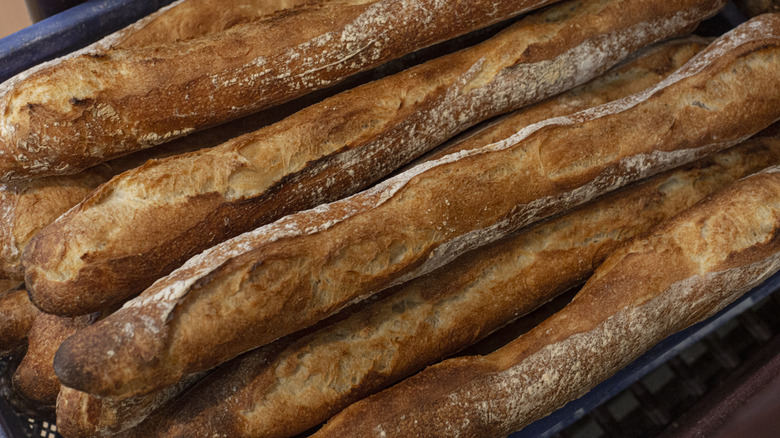How The French Revolution Invented Fine Dining
While France has long been considered by many to be the epicurean center of the universe, the origin story of the French restaurant industry — and consequently the worldwide dining scene that followed its birth — may surprise you. According to Mental Floss, the genesis, which began in France in the mid-18th century, occurred during one of the bloodiest moments in the country's history. Prior to this point, throughout the Middle Ages, the only commercial dining experiences available to commoners were crowded roadside buffets, where hungry travelers could stop in to get a bite of whichever inexpensive family-style dishes the kitchen was serving up that day.
Although the lords, ladies, and other higher-class citizens of France had the opportunity to experience opulent meals, these were still communal affairs, rather than individual dining experiences. This first began to change in Paris around 1765, when a man named Boulanger began selling bowls of bouillon — basically, healthful clear, slow-simmered bone broths — at a sit-down eatery that became known as a "bouillon restaurant" (via National Geographic). This initial early concept gave way to the development of dining halls, where customers could sit and order the dish of their choice from a menu (via Smithsonian Magazine).
While this was a revolutionary moment in culinary history, it also came in the midst of great economic strife in France, during which the poor and oppressed masses — many of whom couldn't afford to eat at these newfound dining halls — took a stand against the wealthy monarchy, ushering in The French Revolution, which began in 1789 (via History). That historic time also changed dining as we know it.
The growing cost of food was at the center of the revolutionary uprisings
According to Smithsonian Magazine, the growing cost of food was at the center of much of this era's uprisings, as impoverished citizens began protesting the price of bread for an example, an essential food item that, at the time, cost a whopping half-day's wages for many late-18th century workers. The exorbitant bread prices, which were due in large part to crop failures, as well as the ensuing widespread famine was blamed heavily on the aristocrats, who ate like kings while implementing heavy taxes on everyday ingredients that commoners used, like salt.
Tensions over these taxes eventually boiled over into full-scale uprisings, like the storming of the Bastille in 1789, which struck fear into the hearts of the French elite. After the wealthiest of Parisians fled the city to escape the rioting and upheaval, their abandoned wines and culinary supplies were left behind for their equally abandoned personal chefs to have their way with — and they sure did.
This perilous moment in French history led to the creation of today's version of sit-down restaurants. Although the first dining establishments can be traced back to China in 1100 A.D. (via History), the restaurants that emerged from the French Revolution were the blueprint for the modern restaurant industry. Those crafty abandoned chefs went on to open the first wave of fine dining and casual restaurants across Paris with the leftover goods they still had access to, and catered to European tourists, businessmen, soldiers, and other diners who remained in the city during the Revolution, thereby setting a precedent we use for dining today.
Napoleon Bonaparte's reign further ushered in what became modern restaurants
Although times of strife weren't always easy on these burgeoning culinary businesses — particularly during the Reign of Terror, when those suspected of fraternizing with aristocrats were sent to prison or the guillotine — for the most part, Parisian citizens that remained in the city reveled in these new, delectably celebratory spaces, where they could taste the work of chefs whose cooking was previously reserved only for the aristocracy (via Mental Floss).
The restaurant industry got a further boost with the arrival of Napoleon Bonaparte in the early 1800s; the ruler declared that every French citizen had the "freedom of pleasure," in hopes that by plying constituents with rich delicacies and free-flowing French wines, they would be too distracted to overthrow him. This moment in history inspired French citizens of all classes of life to dine out for the first time ever, finally feeling free to unwind and enjoy life's little pleasures after a bloody decade-long war.
Today, the resulting restaurant industry is as diverse as its customer base, with businesses ranging from super-cheap fast food joints to the high-end fine dining establishments. So, the next time you're enjoying a night out at your favorite local eatery, think of all the chaos and turmoil it took for you to be able to order a simple meal outside your own home.


